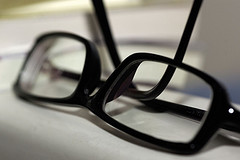Other
Eating well to maintain good eyesight

Computer Science students and professional developers spend a lot of time in front of their beloved computer screens. The additional strain on the eyes, from improper or excessive computer use contributes to the stereotype of an early vision loss. And while it is possible to program without vision, most of us would rather not have to attempt. It’s a good idea to prevent eyesight degradation with multiple approaches, and in this article I would like to explore some dietary options.
Vitamin A is the most commonly known eyesight related nutrient. Among many uses, vitamin A is required in the production of rhodopsin – a pigment very sensitive to light that is used to see in poor lighting conditions. Lack of vitamin A can cause poor vision, while supplementing the intake could restore the eyesight to its previous level. Carrots, apricots, broccoli, and many other vegetables contain good amounts of this vitamin. It is said that a regular diet contains sufficient amounts of A, and that excessive intake above the norm will not have additional benefit. So just make sure you’re not cutting back on a healthy diet, while trying to save some money.


Lutein and Zeaxanthin are two eye related antioxidants that fight with the free radicals, which can cause cell damage. A common cause of free radical oxidative damage is overexposure to the sun’s UV radiation. There has been some research that showed that broccoli sprouts can be effective at protecting retinal cells from ultraviolet light damage. Other studies link lutein with a reduced risk of eye diseases.
Some more foods that are a good source of lutein and zeaxanthin are kale, broccoli, zucchini, corn, garden peas, brussels sprouts, spinach and other green vegetables.
So while the reduction of stress and strain is likely the most effective method against vision loss, proper nutrition also contributes to the preventative maintenance of your eyesight. So eat your veggies ![]()






Eating more veggies is a fantastic idea and I would encourage everyone to do it. But beware of supplements, and especially excessive supplementation–Too much Vitamin A can be toxic or, in the form of carotene, make your skin turn orange (seriously, its called hypercarotenemia).
Reply to comment
Ouch, orange skin? That’d be rather difficult to have
It’d be interesting to see what changes can be done if I were to incorporate such ‘eye-friendly’ foods in my diet. Not that I have computer strain or anything, but prevention is always better than correction.
Reply to comment
Heh, Brandon is right – hypercarotenemia is natures way of saying that you’ve been eating way too many carrots. Though the symptoms are reversible and harmless. You should be fine to eat well, it’s the concentrated supplements that can easily throw you off balance.
Reply to comment
I hate to break it to you but “stress and strain” on the eyes dose not cause long term vision loss. Most studys on this have shown that such strain only causes short term discomfort in the eyes.
Just like how reading to much will not shorten the life of your eyes, looking at a computer screen to long will not either.
Reply to comment
Even if so, the reduction of discomfort is not without benefit.
Reply to comment
Vitamin A dose not have a reduction in discomfort due to eye strain. It whould help fight off age related vision loss. Witch admity is still a good thing and will help the older programmer out there
Reply to comment
Vitamin A indeed does not reduce discomfort in the eyes – this is why breaks are recommended to reduce the buildup of stress. Though deficiency of A contributes to poorer vision.
Reply to comment
This is Great advise. My mother has been telling me this for YEARS, but now that Tony has said it im gonna actually have to believe it.
i just wanted to leave a nice first comment on this site for all the good work Tony is putting into it.
Good job man, some of these articles are actually pretty imformative!
Reply to comment
Hey Pavlin, great to see you finally coming out and leaving some comments! Keep them coming, I know you understand more of my articles than just this one
Reply to comment
I had a LASIK eye surgery in Turky last year and I don’t need glasses anymore. Very brilliant feeling. But after reading this article I definitely will eat more brocoli and other green vegetables. Thanks for this healthy advice.
Greetings from Germany!
Reply to comment
I have played video games for most of my 40 years. Now, I sit in front of a computer for 10-12 hours a day. I do wear glasses and have them updated every 1-2 years and incorporate a lot of green foods like broccoli, spinach, and zucchini in my diet. I also take a multivitamin supplement to cover anything I may miss from just regular eating. Trust me when I say all these things definitely help. Even though you don’t mention it, I think regular exercise helps indirectly in reducing overall fatigue for guys like us who love being in front of the monitor. Anyways, good post.
Cheers from California, USA.
Reply to comment
Thx for the advice CHESSNOID. I also think that regular exercise helps, indirectly or not.
What I like to do during long work hours, is to go outside and walk around for a bit. I suspect that letting my eyes wonder around, focusing on different distances, under different lighting conditions, keeps them in shape.
Cheers from Waterloo, Canada!
Reply to comment
Hardly a bad trade off (orange skin) if it really does help boost your overall imune system!
I used to take juice plus (when I could aford it) and it turned my palms orange.
Worth it.
Reply to comment
Also, on Brandon Thompson’s comment about supplements. Yes, vegees are best, but vertain suppliments ARE worth it if they are high quality. The vegitables in the stores are so saturated with chemicals you almost have to use suppliments.
Thoughts?
Reply to comment
Just to clarify some things – an excess amount of vitamin A alone will not have a significant impact over the recommended daily dose. Though supplements such as juice plus or similar have much more than just A, so that does help your overall health.
And I think that natural vegetables provide a healthier mix of nutrients. Excess consumption of supplements probably warrants a visit to a nutritionist, just to make sure you’re getting the right amount of the right content. It’s easy to make mistakes.
Reply to comment
How much is too much carrots? Other than eating carrots and broccoli are there any other ways to make your eyesight better other than Surgery? Does the surgery hurt? So many questions can someone answer them!
Reply to comment
Well, Vitamin A does go through the body if a normal vegie meal is taken. Supplementation should always be under physician. Vitamin A is a fat soluble vitamin, so excessive intake creates toxic effects. In fact same with all fat soluble vitamins.
The caution in taking these supplementation is taking them in small periods. Take them for 2 months and take again after 2-3 months. This frequency minimizes the possible toxic effect. Remember body has still got greater capacity to steal vitamins from foods than supplements.
Reply to comment